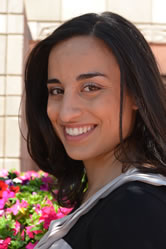Chemical Engineering
“Determining the Effects of Autophagy on Morphology of Aspergillus nidulans”

Filamentous fungi are a crucial part of the current biotechnology economy, particularly when used for the production of therapeutics and enzymes. The Marten Lab, in part, focuses on optimizing fungal protein secretion in Aspergillus nidulans. To this end, hundreds of mutant strains have been generated and screened for increased secretion capacity. Once mutants with high secretion capabilities are identified, their morphology is analyzed, and ultimately strains that also have favorable morphology for use in bioprocesses (i.e., higher branching rate) are selected for further study. Small, highly-branched fungi increase fermentation efficiency by reducing viscosity, thus improving oxygen and nutrient delivery to the cells. We hypothesize that hyphal branching is, in part, regulated by autophagy. Autophagy is a cellular-level recycling process that occurs in a wide range of species from fungi to humans. To test this hypothesis, the morphology of the parent strain TN02A3 is to be compared to that of two strains missing key autophagy genes atg8 and atg13. In order to achieve this, image analysis protocol was developed and preliminary signs of autophagy were established using confocal microscopy with the fluorescently (i.e., GFP) tagged Atg8 protein.
This work was funded, in part, through an Undergraduate Research Assistantship Support (URAS) Award from the UMBC Office of Research Administration. Additional funding was provided by the National Science Foundation (Award 1159973).
How did you find your mentor for year research?
During my first semester at UMBC I received an email from my ENES 101 instructor saying that Dr. Marten was looking for new undergraduate researchers. I sent him my resume and high school transcript (I did not yet have a UMBC transcript), and I was accepted a couple weeks later, and have been there ever since.
How much time do you put into it?
I generally put in 12-15 hours a week for research but it varies depending on the experiment I am conducting.
How did you hear about the Undergraduate Research Award (URA) program?
My predecessor in the lab was a URA scholar, so my research mentor suggested I should apply as well.
Was the application difficult to do?
The application was straightforward. I would say that the most difficult part was making sure it did not exceed the page limit.
How much did your mentor help you with the application?
My mentor was the last person to review my application before it was submitted.
What has been the hardest part about your research?
The hardest part about my research has been trying to understand unexpected results. Often, in research, you can reach a road block and the difficult part is trying to figure out if this is the result of human error, an error in theory, or an error in the hypothesis.
What was the most unexpected thing?
Although I was told communication is a key component of research, I was surprised at how much time I spend using this skill. The importance of spending time to communicate results has become increasingly clear, whether it is explaining individual experiments in lab notebooks and weekly reports or developing larger-scale presentations for team members or conferences.
How does your research relate to your work in other classes?
As a chemical engineering major, I have to take classes in a wide variety of fields, and the work inside the lab has really helped me understand the importance of interdisciplinary studies. Genetics, Cell Biology, Statistics and Organic chemistry are all directly related to my field of research, and help me to fully understand the theory behind my research. On the other hand, the work I have done in the lab has given me skills in experimental design (a crucial component of ENCH 225) that I would not have had otherwise.
What is your advice to other students about getting involved in research?
Find your personal motivation to do research and talk to people who are currently involved in your field of interest. Once you have done that, make sure you can find the time in your schedule. This is often the most difficult thing to do, but with the right motivation, it is usually possible. Find research that gets you excited and apply to work in that laboratory. It is always possible to find time to devote to doing something you love.
4/3/2014